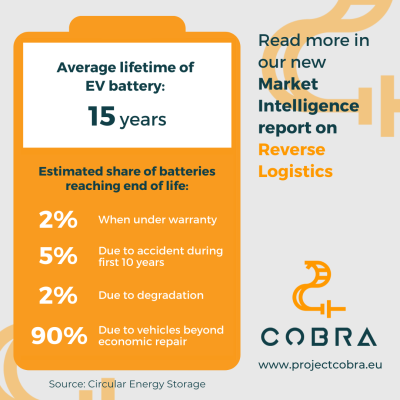The Reverse Logistics of Li-ion Electric Vehicle Batteries
Li-ion batteries have gained a prominent position in the ongoing electrification of global transport. Here, retaining critical materials from used Li-ion batteries could be crucial to counter some of their negative externalities. Examples of retaining material value include battery reuse, remanufacturing, repurposing, and recycling. To support the value retention of Li-ion batteries, a safe and efficient reverse logistics chain is needed.
In the next decade, the number of returned electric vehicle batteries (EVBs) is expected to surge. By 2030 there will be 111,000 tonnes (or 25 GWh) of end-of-life EVBs in Europe, while almost 500 GWh of new batteries will be placed on the market. This means tens of thousands of heavy-duty trucks transporting end-of-life batteries a year, many of which transport them as dangerous goods.
With the EU’s focus on establishing the safest and most sustainable value chain for Li-ion batteries in the world, the surge in EV sales and society’s growing concern for sustainability, interest in the reverse logistics of Li-ion batteries is increasing. Public and private stakeholders are urged to create new regulations, business models and supporting technologies.
Reverse logistics is often overlooked, but essential in retrieving critical raw materials from EV batteries. Reverse logistics in the context of electric vehicle batteries (EVBs) start when the EV user decides that the battery is not fulfilling their needs and stop when the battery reaches the point where the remaining value is utilised, e.g., through recycling, repurposing or remanufacturing.
Due to the immaturity of EV battery recycling worldwide, reverse logistics remains very underdeveloped. Several regulatory, technical and economic challenges remain to be solved. In our latest market intelligence report, we’ve outlined the ongoing trends and current state of the reverse logistics of Lithium-ion batteries.
Special thanks to William Bergh, Founder of Cling systems and Philippe Jacques, Secretary-General of BEPA (The Batteries European Partnership Association) for their valuable contributions!
Want to get in touch with the COBRA team?
Contact cobra@baxcompany.com or visit our Twitter and LinkedIn channels.





